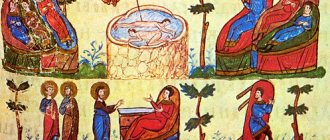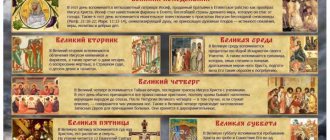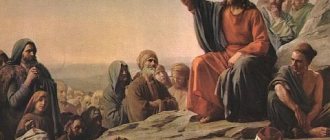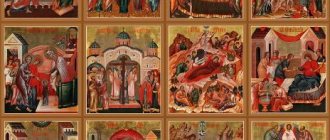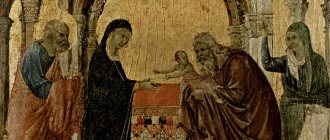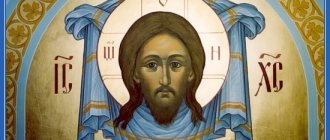January 19. For the Sunday Gospel reading.
Then Jesus comes from Galilee to the Jordan to John to be baptized by him. John restrained Him and said: I need to be baptized by You, and are You coming to me? But Jesus answered him: Leave it now, for thus it is fitting for us to fulfill all righteousness. Then John admits Him. And having been baptized, Jesus immediately came out of the water, and behold, the heavens were opened to Him, and John saw the Spirit of God descending like a dove and descending on Him. And behold, a voice from heaven said: This is My beloved Son, in whom I am well pleased (Matthew 3:13-17).
Saint Nicholas of Serbia (Velimirović)
Optina Pustyn
In the name of the Father and the Son and the Holy Spirit.
Today is Sunday, dear fathers, brothers and sisters, the Holy Church offers us an excerpt from the Evangelist John about the Lord’s meeting with the Samaritan woman at Jacob’s well (John 4:5-42). The Lord, as a merciful, loving Creator, strives to do good, to do it selflessly, to do it everywhere, to do it unceasingly.
And so He, exhausted from the heat, because He spent the night in prayer and during the day hurried to do His great deeds, comes to this well, releasing the disciples into the city to buy food. He cares about the soul that comes there, about the Samaritan woman, a resident of that area of \u200b\u200bthat people, who, by the power of fate, both Divine and human, fell away from the people of Israel, and while maintaining faith in one God, in a sense, deviated into heresy. Therefore, the Jews did not communicate with the Samaritans. But the Lord comes to attract the soul of this woman, seeing long before her trembling heart, her ardent, thirsty and hungry soul, located in this heat of passions, exhausted from the burden of sin, but seeking truth in her heart, which she reveals in conversation with Christ. She comes to draw water from this source at this very hot time. And what is later learned from her life explains why she came at this very hour, when there was no one at the well. Because she had 5 husbands, five men. And the one with whom she lived at that moment was not her husband. That is, she did not have the best life. It is she who comes when no one comes in this scorching heat, so that once again, perhaps, they do not meet one of their fellow citizens there.
Christ asks her to drink, because He, as a person, needs food, and drink, and rest, and clothing, and all human needs, so simple and natural for each of us. Because He, being the omnipotent Creator, immeasurably and unceasingly benefits man, always forgetting Himself. None of His miracles are for Himself. All His miracles are continuous blessings to the human race, continuous benefits to people, to each of you and me. And so the Creator shows us an example of how we need to live in order to be like Him, wasting ourselves for everyone, wasting ourselves in order to finally find ourselves in this, to find our personal meaning and that true human depth. This Samaritan woman is surprised at His question, saying that Jews do not communicate with Samaritans, and how You, being a Jew, ask me, the Samaritan woman, to drink water (v. 9). But the Lord, taking a pretext from this, leads her to a greater depth of which she is capable, saying that if you knew Who is speaking to you, you would ask Him for living water, which would become a source of water leading to eternal life (v. 10), living water, that is, that which flows alive.
And so Christ offers her this course. But she, not yet fully understanding, being a simple woman, says: how can you give me this water when you don’t even have a drawer? (v. 11) And in fact, Christ our Lord leads her to the idea that this water, which He is ready to give to everyone who believes in Him, is the water of the Holy Spirit, the water of divine grace, that life-giving water that waters the parched hearts of men. , shriveled and cracking human souls. And this woman understands that this is not an ordinary person in front of her, because the Lord says to her: bring your husband here. And when she, in bewilderment, says what seems to be the truth, that I don’t have a husband, the Lord, wanting to turn her to repentance, without denouncing her, also gives her a reason that you told the truth that you don’t have a husband. Because you have had five husbands, and the one with whom you now live is not your husband (vv. 16-18).
It would seem that this is a modern situation. Now many of modern people are trying to live exactly like this Samaritan woman. But, nevertheless, for her this spoken word by God becomes a revelation that He knows her whole life. And she immediately understands that this is not an ordinary person, and says that You are a prophet (v. 19). And he begins to ask Him about completely different things, asking Him about the fact that you bow in Jerusalem, and we bow in this place; and where is the proper worship of God? (v. 20) The surprising thing is that as soon as she realized that in front of her was a spiritual man, a complex man, her questions became deep and spiritual, those that truly worried her in the depths of her heart, despite her far from unrighteous life .
Are we capable of this? Very many modern Christians also crowd out spiritual fathers, crowd out all kinds of elders, endlessly searching for some kind of spiritual people. But what do they most often come with? What do they care about? Often, unfortunately, these are some completely everyday issues. And they are important, of course, in a person’s life. And they need permission if a person has acquired true faith. But sometimes, having acquired this faith, a person lives as if he had never found it, as if all those vows that he made and promised to Christ had long been forgotten by him and did not happen to him. He lives as if his whole life is here on earth. And there is so little left for heaven in his heart, in his life. And this Samaritan woman shows us an example of how her heart still lives by this, strangely enough, but still the ideal of heaven. How divine spiritual things excite and disturb her soul. This is exactly what she asks Christ, who tells her that you bow to him whom you do not know, we bow to him whom we know, because there is salvation from the Jews (v. 22).
And truly He, the true God and the true Man, came from the Jewish people to grant freedom and salvation to the entire human race. But those who worship God in Spirit and in truth are true worshipers. And the Heavenly Father is looking for such fans. Truly, only in spirit can one bow to God at this peak of human life, in this most sublime component of human nature, in his entire being, at the limit of his human being and existence. Only in this innermost essence can a person truly worship God not with his knees, not with his waist, not with his neck, of course. It is not this kind of worship that God seeks, but first of all, worship in all one’s being, when a person worships his Creator in spirit. But he worships not only in this deep being, but first of all also in the truth, so that he himself, confessing the truth with his life, stands in it. Only in this way can one worship the Creator in order to do His holy divine will, to do His commandments, to believe in Him unshakably purely, truly and truly, and so that this truth of his worship will be witnessed by his life, the directness of his words and deeds, the purity of his deeds and thoughts and actions, impeccability and constancy of everything that happens in his life, the entire circle of his life. Of course, this is very difficult for a person and almost impossible to do without God. But we must at least strive for this, in order to worship our Creator and Creator in this truth. And on these Easter days, when Christ rushes to fight the devil and courageously comes out for this duel with death, hell and Satan himself, He, as a true man of truth, a fearless warrior, is made the winner of death, hell, and the devil.
And we, today celebrating the memory of the Great Martyr George the Victorious, also this fearless warrior, who, like his Creator and Maker, goes out to this duel with death, with his tormentor, with Satan himself. And fearlessly goes out to duel with death, not fearing it, we prepare to completely surrender ourselves to the will of the Creator and to His loving right hand, so that in this torment, ground, tortured, cut into pieces, we become truly Christ’s, completely united with Him. This young man, so handsome, seemingly immaculate, raised in the faith from childhood, reached great heights in public service, the favorite of the emperor, the head of his guard - this is a huge position, directly having access to the emperor, treated kindly by him and gifted in every possible way, however less, he remains faithful to the one King - Christ our Lord. And he, entering this field of torment, shows us that it is impossible to serve God without giving oneself entirely to the Creator, without betraying one’s entire life into His hands.
And no one will ever withstand even small torments if he does not have true humility, this readiness to completely surrender himself into the hands of the Creator. If at least something of our own remains in us, even a small opinion about ourselves, then we will not be able to withstand these not terrible and small torments, because somewhere in the depths of our hearts there is hope for ourselves. And only those who trust in God, not in words, not in some declared slogans, but truly with their lives in the depths of their hearts, will be able to withstand these tests and walk this path to the end. Will it be some kind of external sorrow, all sorts of slander and envy that raises spirits of malice against the true followers of Christ, or will it be imprisonment, exile, torture and torment? But all this is possible only in this devoted service to Christ, in this selflessness and self-denial of one’s human “I”.
And so the Lord, crowning the martyrs, invites you and me to follow the righteous path, because it is amazing that this Samaritan woman, who entered the city after Christ responded to her words that when the Messiah comes, Who will tell us everything, says: It is I speaking to you (v. 26). And she runs to tell her fellow citizens that this man who told her everything is Christ. How amazing that these simple Samaritan people believe the words of this woman. The Jews did not believe the words and deeds of Christ Himself. Only a few believed in Him, and these Samaritans believed in a far from pious woman who lived in their city. But her words were so bold, so amazingly truthful, that no one doubted the justice of her words. And when they came to Christ, they saw Him and believed in Him. And they said to Him, not as these pig-loving Gadarene inhabitants said: get out of our borders, but on the contrary, they begged Christ to come to them. And Christ arrived with them for two more days.
Let us remember that the Lord shows His disciples that He has other food to do the will of the Heavenly Father. And those harvests that turned white are those nations to whom the apostles were to preach, leading them to Christ. “The harvest is plentiful, but the laborers are few,” says the Lord (Matthew 9:37). And you and I are not only the harvest of the Lord, but each of us, to some extent, is a worker of Christ’s field. Let's not forget about this, that each of us is called to preach Christ with our word, and with our life, and with our deeds, with our whole image, as a person who is striving for eternity, as one for whom the ideal of heaven is the only and only ideal of his life . So that our life would not be such that we never knew Christ, did not read the Gospel, because sometimes Christianity is completely indeducible from our life. It is no coincidence that the apostle says: you blaspheme the name of Christ among the pagans (Rom. 2:24), which is why there are so many attacks on the Church.
Let us not forget that the body of Christ is not a hierarchy, not bishops and priests. These are all lay people, including the church hierarchy. They are all the body of Christ. And each of us must be this example and warrior of Christ God, without which this courageous service to Christ is impossible to become Christ’s. We must not forget about this, that each of us has the right to vote in the Church, has the right to preach Christ, to defend the truth of Christ. And it is precisely in this ecclesiastical consciousness that only there can be a genuine revival of both the community life of the Church and, in general, the entire ecclesiastical Christian life.
May the Almighty Lord, who rose for the sake of our salvation and leads us to resurrection from death, vouchsafe us to receive this co-resurrection with Him forever.
Amen.
Hieromonk Nazarius (Rypin)
May 6, 2022
Who is the Samaritan woman
The main character of the Gospel story, which is remembered on the fourth Sunday after Easter, is a woman, a resident of Samaria. Her name, according to legend, was Photinia. Translated, this word means “bright”, hence the identical female name – Svetlana. She became famous for the fact that, having believed in Christ, she led many people, her fellow countrymen, to him. The Gospel says that after her words, many went to see Him. Christ stayed at their request in the city for two days, the result of which was a large number of those who believed in Him.
Photinia ended her earthly life with a martyr's crown. According to legend, she was burned alive because of her faith. The church received a canonized saint, whom Svetlana can consider her patroness.
